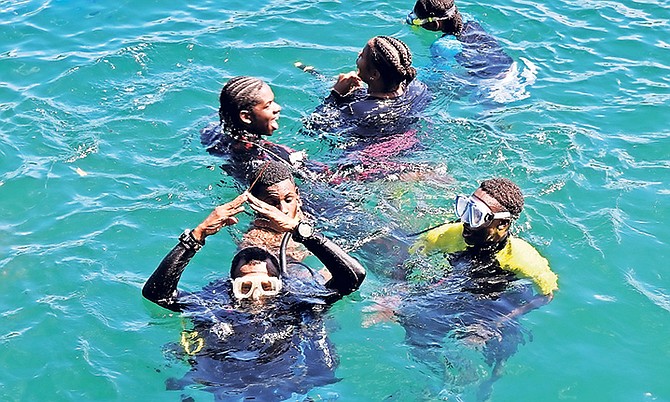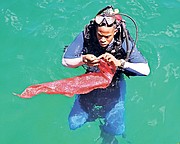FOR many people marine debris is out of sight, out of mind.
Thankfully however, divers have the unique ability to bring to the surface what is going on beneath the waves and this is exactly what the student dive team of the Bahamas Agriculture and Marine Institute (BAMSI) has been engaging in over the past few weeks. The project is part of a global initiative called 'Dive Against Debris' which was first launched in 2011 by Project AWARE.
The dive team, accompanied by Dr Vallierre Deleveaux, head of BAMSI's marine science division and a PADI open water scuba instructor, removed debris from Captain Bill's Blue Hole located in Blue Holes National Park in Central Andros. As a popular tourist attraction on the island, the team felt it was important for the community to present the best possible image. At the end of the day the team collected nearly 80 pounds of garbage and debris from the blue hole.
Also working with the dive team - who are all open water and advanced open water certified - was a student snorkel team who provided surface support by collecting the debris-filled mesh bags from divers at the surface. The clean-up removed several bags of debris, totalling 250 articles. The largest offenders in terms of materials included glass, aluminium products and plastics. Beer bottles and cans formed the vast majority of these articles.
The main objective of the clean-up initiative and similar projects that BAMSI's student affairs division is planning, to raise awareness and educate the students and the community at large about the importance of keeping the island's environment clean.
A second Dive Against Debris was conducted with a small dive team under the supervision of Dr V Deleveaux on October 3 at Uncle Charlie's Blue Hole in North Andros. The site showed promise as marine debris pollution was found to be minimal within the blue hole. Further, the site had healthy aquatic fauna with a population of crabs and a blind fish species being present. The aquatic site exhibited relatively little anthropogenic impacts when compared to the first dive site.
'Dive Against Debris' involves two parts: debris removal and reporting. Removing rubbish improves the underwater habitat while reporting any findings helps reveal the extent of the global marine debris crisis. Without debris data, scientists and conservationists cannot advocate for change. Since its initial launch, more than 30,000 divers in 50 plus countries have geared up to protect the ocean and the creatures who live there.





Comments
Use the comment form below to begin a discussion about this content.
Sign in to comment
Or login with:
OpenID